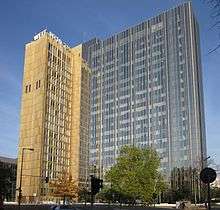Axel Springer SE
|
| |
| Societas Europaea | |
| Traded as | FWB: SPR |
| Industry | Publishing |
| Founded | 1946 |
| Founder | Axel Springer |
| Headquarters | Berlin, Germany |
Key people |
Mathias Döpfner (CEO and Chairman of the management board) Giuseppe Vita (Chairman of the supervisory board) |
| Products | Magazines, newspapers, online portals, affiliate marketing |
| Revenue | €3.3 billion (2015)[1] |
| €559.0 million (2015)[1] | |
| €304.6 million (2015)[1] | |
Number of employees | 15,023 (average, 2015)[1] |
| Website |
www |
Axel Springer SE is the largest digital publishing house in Europe, with numerous multimedia news brands, such as Bild, Die Welt, and Fakt and more than 15,000 employees. It generated total revenues of about €3.3 billion and an EBITDA of €559 million in the financial year 2015. The digital media activities contribute more than 60% to its revenues and nearly 70% to its EBITDA. Axel Springer’s business is divided into three segments: paid models, marketing models, and classified ad models.
Headquartered in Berlin, Germany, the company is active in more than 40 countries with subsidiaries, joint ventures, and licensing.

It was started in 1946/1947 by journalist Axel Springer.[2] Its current CEO is Mathias Döpfner. The Axel Springer company is the largest publishing house in Europe and controls the largest share of the German market for daily newspapers; 23.6%, largely because its flagship tabloid Bild is the highest-circulation newspaper in Europe with a daily readership in excess of 12 million.[3]
Newspapers, magazines, online offerings
The media offerings of Axel Springer SE are clustered in: current news, autos, sports, computers and consumer electronics, as well as lifestyle.


Selection of publications
- Die Welt, the intellectual flagship of the company
- Bild, tabloid with the largest circulation in Europe
- Auto Bild, automobile magazine with the largest circulation in Europe
- Audio Video Foto Bild, magazine for consumer electronics
- Computer Bild, published in nine countries, is Europe's best-selling computer magazine
- Sport Bild, published in many countries, is Europe's largest sport magazine
- Auto.cz, the largest Czech internet car portal including RoadLook.tv, starting in Slovakia and Poland as well
- Fakt, the largest daily tabloid in Poland
- B.Z., local newspaper
- Watchmi, a personalized TV content discovery system[4]
- Musikexpress, a monthly music magazine
- the German edition of the magazine Rolling Stone
- Transfermarkt, a football statistics website
- Business Insider, a business, celebrity and technology news website
- INSIDER, a social-first lifestyle publication.
In addition, the company is active in the online editorial and marketing business with its shares in aufeminin.com, Awin, and buy.at and owns several classified advertising online platforms such as the online career site StepStone, the real estate marketing portal immonet and price comparison platform idealo.
History
- 1946: Publisher Hinrich Springer (66) and his son Axel Springer (34) establish the limited company Axel Springer Verlag GmbH. Launch of the NORDWESTDEUTSCHE HEFTE and the radio and TV magazine HÖRZU.
- 1948: Launch of the evening newspaper HAMBURGER ABENDBLATT, the first daily created by Axel Springer.
- 1952: Launch of the popular daily BILD. The paper was based on the British tabloid Daily Mirror,[5] and peaked at circulation of 5 million in the 1980s.[6]
- 1953: Axel Springer Verlag buys the publishing house DIE WELT, including the daily paper DIE WELT and the Sunday paper WELT am SONNTAG.
- 1956: Company headquarters in Hamburg is built.
- 1959: The company acquires the majority holding in Ullstein AG, including the Berlin newspapers BERLINER MORGENPOST and B.Z. and the Ullstein book-publishing business.


- 1966: Official opening of the Berlin headquarters. Hamburg remains important site.
- 1968: After the attack on the students' leader Rudi Dutschke on 11 April 1968 the APO (Extra-Parliamentary Opposition) starts acts of violence against the company. The APO had a history of animosity with the Springer Group's allegedly biased coverage of the student movement. For instance, in the wake of the shooting of Benno Ohnesorg by the police at a student demonstration against the Shah, one Springer paper reported that “what happened yesterday in Berlin had nothing to do with politics… It was criminal in the most sickening way.”.[7] In fact, Ohnesorg, who had never attended a demonstration before, had been shot in the back while trying to leave the demonstration.[8]
- 1972–73: Building of the offset-printing plant in Essen-Kettwig.
- 1984: Official opening of the offset printing facility in Ahrensburg near Hamburg.
- 1985: 49% of the company is offered for public subscription.[9] Later that year Axel Springer dies. Control is passed to his widow Friede Springer.[10]
- 1986: The first licensed edition of AUTO BILD comes out in Italy. Other licensed editions and joint venture publications later appear in twenty European countries, Indonesia and Thailand.
- 1993: Official opening of the offset printing works in Berlin-Spandau.
- 2001: Axel Springer and T-Online establish a joint subsidiary Bild.de/T-Online AG.
- 2002: Launch of immonet.de. Mathias Doepfner, former editor-in-chief of Die Welt, becomes CEO of Axel Springer AG.[11]
- 2003: Name is changed to Axel Springer AG
- 2009: Axel Springer AG acquires affiliate marketers Zanox and Digital Window as well as StepStone ASA[12]
- 2010 a $635.7 million offer by Axel for leading French real estate website operator seloger.com caused seloger shares to rise as much as 32% the most since it went public. Within 3 days Axel increased its offer 15.6% to $735 million after seloger shareholders rejected the deal.[13][14]
- 2012 Axel Springer forms a joint venture (Axel Springer Digital Classified) with global growth equity firm General Atlantic.[15] The company buys TotalJobs in the UK from Reed Elsevier.[16]
- 2013: Springer sells its regional newspapers, woman's magazines, and television magazines to Funke Mediengruppe for €920 million[17]
- 2013: Publications Grand Public, a French magazine publisher owned by Springer, is sold to Reworld Media.[18]
- 2015: Axel Springer AG purchases Business Insider, a business, celebrity and technology news website, in a deal that values Business Insider at $442 million.[19]
- 2015: On December 8, Axel Springer increased their share in Axel Springer Digital Classifieds GmbH from 70 per cent to 85 per cent, and was granted a purchase option to acquire the remaining 15 per cent from General Atlantic. On December 9, Axel Springer exercised the option, acquiring the additional 15% from General Atlantic in exchange for shares of Axel Springer, leaving the growth equity firm with 8.3% holding in the company.[20][21]
Criticism
Zionism
The Axel Springer SE is criticized by German leftists and Muslims who maintain that Springer media show excessive support for Israel.[22]
Accusations of censorship
Axel Springer AG refused to publish advertising campaigns of the Left Party in 2005 as well as of the socialist PDS in earlier elections.[23]
Insulting Poles in Germany and Germans in Poland
"In 2008 the German Journalist Association in Landau-Hessen passed a resolution that it was unacceptable for the editor to insult Germans in his newspapers in Poland and to insult Poles in his tabloid Bild in Germany. As a consequence of the resolution Axel Springer was awarded the title 'Hyena of the Year' by the Polish Journalists Association because his newspapers published in Poland fuel anti-German attitudes," according to Prof. Bogusława Dubek-Ostrowska, University of Wroclaw.[24]
In 2017, the head of the Ringier Axel Springer joint venture, Mark Dekan wrote a letter to Polish employees of the joint venture calling the Polish politician Jaroslaw Kaczynski a 'loser' for opposing the candidacy of Donald Tusk as President of the European Union and stating that 'we should never forget about the basic values that we represent... Here is the moment where free media, such as ours must be active. We speak for the ideas of... a United Europe.' He also noted his concern that European integration was least supported by the youngest generation of Poles and vowed to take action against that. Tusk, heavily promoted by Angela Merkel, was re-elected President against the opposition of the Polish government. This letter has been widely interpreted in the Polish media as setting the 'German' EU-unification party line for the staff of all RASP controlled media in Poland.[25]
Competitors
Major competitors in the German publishing market include Bauer Media Group, Bertelsmann, Hubert Burda Media, and Holtzbrinck.
Attacks
In the 1960s and 1970s the company was targeted by a number of left-wing groups. It was denounced by German-American writer Reinhard Lettau in an incendiary speech at the Freie Universität Berlin; in 1968 their Berlin headquarters was blockaded by students; in 1972 the Red Army Faction claimed responsibility for six bombs placed in the Hamburg building (only three exploded and 17 people were injured) and in 1975 a bomb exploded in their Paris office, the "6th of March Group" (connected to the Red Army Faction) claimed responsibility.[26]
See also
References
- 1 2 3 4 "Axel Springer SE Annual Report 2015". Retrieved 16 March 2016.
- ↑ "www.axelspringer.com". Archived from the original on 18 July 2011. Retrieved 9 September 2010.
- ↑ Hans J. Kleinsteuber in Kelly. M, Mazzoleni. G and McQuail. D. eds. 2004 "The Media in Europe. The Euromedia Handbook."
- ↑ "watchmi - Persönliches Fernsehen von TV DIGITAL". www.watchmi.tv.
- ↑ "Sex, Smut and Shock: Bild Zeitung Rules Germany". Spiegel Online. 25 April 2006. Retrieved 14 July 2014.
- ↑ Kirschbaum, Erik (23 June 2012). "German daily sent to all 41 million households". Reuters. Retrieved 14 June 2014.
- ↑ Jeremy Varon, Bringing the War Home: The Weather Underground, the Red Army Faction, and Revolutionary Violence in the Sixties and Seventies (Los Angeles: University of California Press, 2004), p.39
- ↑ Jillian Becker, Hitler’s Children: The Story of the Baader-Meinhof Terrorist Gang (New York: JB Lippincott, 1977), p.39
- ↑ Noam, Eli (1991). Television in Europe. Oxford University Press. p. 90. ISBN 0195069420.
- ↑ "Springer May Shake Up Ad Market With ProSieben1 Bid (Update1)". Bloomberg. 1 August 2005. Archived from the original on 15 July 2014. Retrieved 14 July 2014.
- ↑ Boston, William (10 February 2014). "In Axel Springer's Bid for Forbes, a German Player Steps Out". The Wall Street Journal. Retrieved 14 July 2014.
- ↑ Chronicle on www.axelspringer.com
- ↑ "Seloger.Com Shares Rise Most Ever as Shareholder Questions Springer Offer". bloomberg. 13 September 2010. Archived from the original on 3 November 2012. Retrieved 2 July 2013.
- ↑ "Axel Springer plans no higher offer for seloger.com". 16 September 2010.
- ↑ "General Atlantic in €237m JV with German publisher Axel Springer". AltAssets. 6 March 2012. Retrieved 14 July 2014.
- ↑ "Axel Springer buys Reed Elsevier's Totaljobs site". MarketWatch. 4 April 2012. Retrieved 14 July 2014.
- ↑ Schultz, Stefan; Steinmetz, Vanessa; Teevs, Christian (26 July 2013). "Sell-Off: Newspaper Giant Turns Back on Journalism" – via Spiegel Online.
- ↑ Editorial, Reuters. "Axel Springer sheds some French magazines -report".
- ↑ "German publishing powerhouse Axel Springer buys Business Insider at a whopping $442 million valuation".
- ↑ "Axel Springer gives General Atlantic shares for classified ads stake". Reuters. Retrieved 18 December 2015.
- ↑ "Axel Springer acquires the remaining 15 percent in online classified ad company Axel Springer Digital Classifieds". Retrieved 18 December 2015.
- ↑ "Muslim-Markt - Boykott Axel Springer". www.muslim-markt.de.
- ↑ "Springer-Presse boykottiert Linkspartei – Wikinews, die freie Nachrichtenquelle". de.wikinews.org.
- ↑ Doobek-Ostrowska, Bogusława (2012), "Chapter 3. Italianization (or Mediterraneanization) of the Polish Media System? Reality and Perspective", in Hallen, Daniel C.; Mancini, Paolo, Comparing media systems beyond the Western world, Cambridge U. Pr., pp. 26–50, ISBN 978-1-107-69954-0
- ↑ TYLKO U NAS. Treść CAŁEJ instrukcji szefa Ringier Axel Springer dla polskich dziennikarzy. Szokujące słowa!, (Reference in Polish language, cites URL "wpolityce" in Poland (.pl))
- ↑ Baader-Meinhof.com Archived 15 June 2006 at the Wayback Machine.
External links
| Wikimedia Commons has media related to Axel Springer AG. |